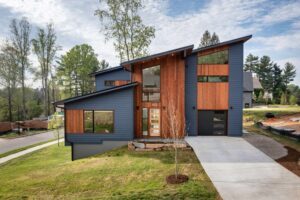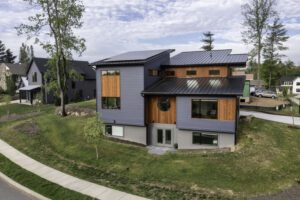When Mark Wulff and Ariana DeToro-Forlenza met in 2004 as instructors at an outdoor school, there were nights when they slept in the open air with nothing but a sleeping bag between them and the sky.
When they bought their first home in 2011, 900 square feet in West Asheville was plenty for their active lifestyle — it was a roof over their heads. After one decade, two kids, and years of experience building homes for others, what used to feel cozy was beginning to feel cramped.
“We started dreaming of our new home years before we started building it,” said Wulff, a founder and owner of Brown Wulff Homes. “But from my experience building, I know that a house has to be responsive to the land it’s on, so we didn’t make any specific design decisions before we found our lot.”
When they finally found their lot in Malvern Walk, they had the canvas they needed. With the help of their architect, they set out to design an energy-efficient, creative, family-friendly home with a few critical priorities to guide them:
- Green building practices, including an all-electric energy model
- Lots of glass to fill spaces with light and take advantage of southwest views
- A connection between indoor and outdoor living spaces
“Ari and I never want to lose that connection with our environment that has been an important part of our careers and lives,” Wulff said. “As we grow, we encounter new ways to act on our ideals. For our family right now, that means building and maintaining a house in a way that is thoughtful about our energy use and the impact we have on the climate. We understand the environmental impact that building a new house has, so we were committed to building a house that would utilize those resources to build a home that we hope will last for generations.”

When they broke ground on the project, they decided to pursue the highest level of Green Built Homes certification they could achieve, without breaking the bank. They wanted to prove that building green can be cost effective and easier to achieve than some might think. They knew from experience that it would require paying attention to the details and making smart, and sometimes tough, choices along the way.
A specific example that highlights the decision-making process during the build came when it was time to sheath the exterior walls. Initially they hoped to include both ZIP R-sheathing for additional insulation and a rainscreen to extend the life of the sheathing and siding. After costing out both options, the budget forced them to choose between the two.
After researching and talking with other green-building experts, they decided that the cost of the ZIP R-sheathing was not worth the resulting increase in R-value and that the payback on choosing that system would be prohibitively long. They opted instead for a rainscreen behind all the siding that will allow the sheathing and siding to breathe and extend the life of the exterior of the home.
Not all choices were as difficult. The cost benefit of installing a residential photovoltaic solar system was clear and it was a commitment from the very beginning of the project.
“I believe we’ve passed the tipping point for solar,” Mark said. “Solar might not be everyone’s choice yet, but it should be a part of every new build conversation. I would encourage anyone building a new home to think of solar as part of the build cost and not a future add-on project.”
After rebates and credits, the system should pay for itself in just over nine years. Some other energy-conscious decisions that also made the cut include a heat pump water heater, induction cooktop, electric vehicle charging hookup, and a variable speed heat pump.

Everyone can see when someone chooses solar, but there is another part of the building story that’s literally more hidden, and maybe more important.
“Attention to detail can often do more for a house than the latest new material or technological innovation,” said Josh Brown, the other founder and owner of Brown Wulff Homes. “On this house, that meant spending an extra day or two over the project using primarily tape, caulk, and spray foam to create an exceptionally tight building envelope.”
In order to ensure they were on track during the build, they opted to have the house blower door tested prior to insulation and sheetrock being installed, and then again when the house was completed.
“Construction of a house can often happen in pretty distinct silos and we feel it’s our job to bridge the gaps between all the different sub-contractors,” Brown said. “Sometimes this means we do a little extra work, but often it is just ensuring that communication is clear and followed through on.”
As they proved with the results, what makes something well built can also make it green. The Malvern Walk home has some impressive achievements to go along with its striking appearance:
- Green Built Homes’ Platinum Net Zero certification
- Home Energy Rating System (HERS) Score of 10, which means it has 90 percent better energy efficiency than the average home
- 0.49 ACH50, which denotes an exceptionally tight house and an energy recovery ventilator for fresh air circulation
- 8.1 kW photovoltaic solar system should provide 90 percent or more of needed energy
Mark and Ariana now have more roof over their heads than they once did. If you look closely, you can see that the pitch of the rooflines follow the slope of the land on which it’s built. It’s just one way that their connection with the environment stays intact even as their housing needs evolve.
For them, it’s a little strange to no longer be living in such close quarters, but It helps their adjustment to know that their house will produce more energy than it uses and it’s built to last for generations.
They always knew their children and grandchildren would inherit the earth. Now they’ll inherit a place to call home.
Josh Brown and Mark Wulff are the founders and owners of Brown Wulff Homes. Connect with Josh and Mark at brownwulffhomes.com.
You can also view this article as it was originally published on page 18 of the 2021-22 edition of the directory.

